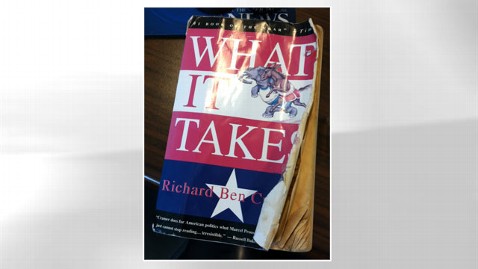Remembering RBC, Chronicler of Political Candidates

Amy Walter/ABC News
Indulge me, please, as I join many of my political colleagues in paying tribute to Pulitzer Prize-winning journalist Richard Ben Cramer, who died Monday at age 62.
As many of my peers have shared on Twitter, Facebook and in print, the former Philadelphia Inquirer journalist's political tome, "What It Takes," inspired us to take up political journalism.
But, for me, the book that chronicled the lives of the men who ran for president in 1988 represents an era of political journalism that is, sadly, fading away. Cramer focused on the personal stories of the men who wanted to be president, not simply on the process behind the campaigns. Through exhaustive research, Cramer found a way to uncover every nook and cranny of the lives of Joe Biden, Gary Hart, Michael Dukakis, Richard Gephardt, Bob Dole and George H.W. Bush.
While voting records and campaign war-stories are important elements of a presidential profile, an understanding of where the candidate came from - his childhood successes and failures, his transition from adolescence to adulthood - is the most telling. His chapter on Bob Dole's recovery from his WW II injuries helped those of us who only knew him as the man with the hand awkwardly clutching a pen truly appreciate what that injured limb meant.
To be sure, Cramer did not set out to make these guys look like saints. Far from it. But he wanted us to understand what made them do what only a tiny fraction of Americans will ever do: wake up one day and say "I can be president."
Get more pure politics at ABCNews.com/Politics and a lighter take on the news at OTUSNews.com
For 10 years, I interviewed House candidates for the Cook Political Report. The most important part of that hour-long interview was the first 15 minutes where I asked them about their stories. Where did they grow up? What did their parents do? Where did they go to high school?
It was in the telling of these stories that the real person - not the well-practiced politician - was revealed. My favorite example is Stephanie Herseth, then a young D.C. lawyer who decided to move back to her native South Dakota to run for the state's only House seat. Many, including me, were wary that the Georgetown grad could convince parochial South Dakotans that she hadn't "gone Washington."
But during our interview, I learned that she raised pheasants as a kid. As a suburban kid myself, I asked what she did with them. "I sold them to the preserve," she said. "Oh," I said, "so they lived on like a farm?"
Um, no, she said, so people could hunt them.
It was at that moment I realized that Herseth (who won the seat that she eventually lost in 2010) could convince South Dakotans that she was not some city slicker trying to buy a seat in the state.
I will always be thankful to Richard Ben Cramer for helping me to remember the importance of humanity in what can be a very dehumanizing process.